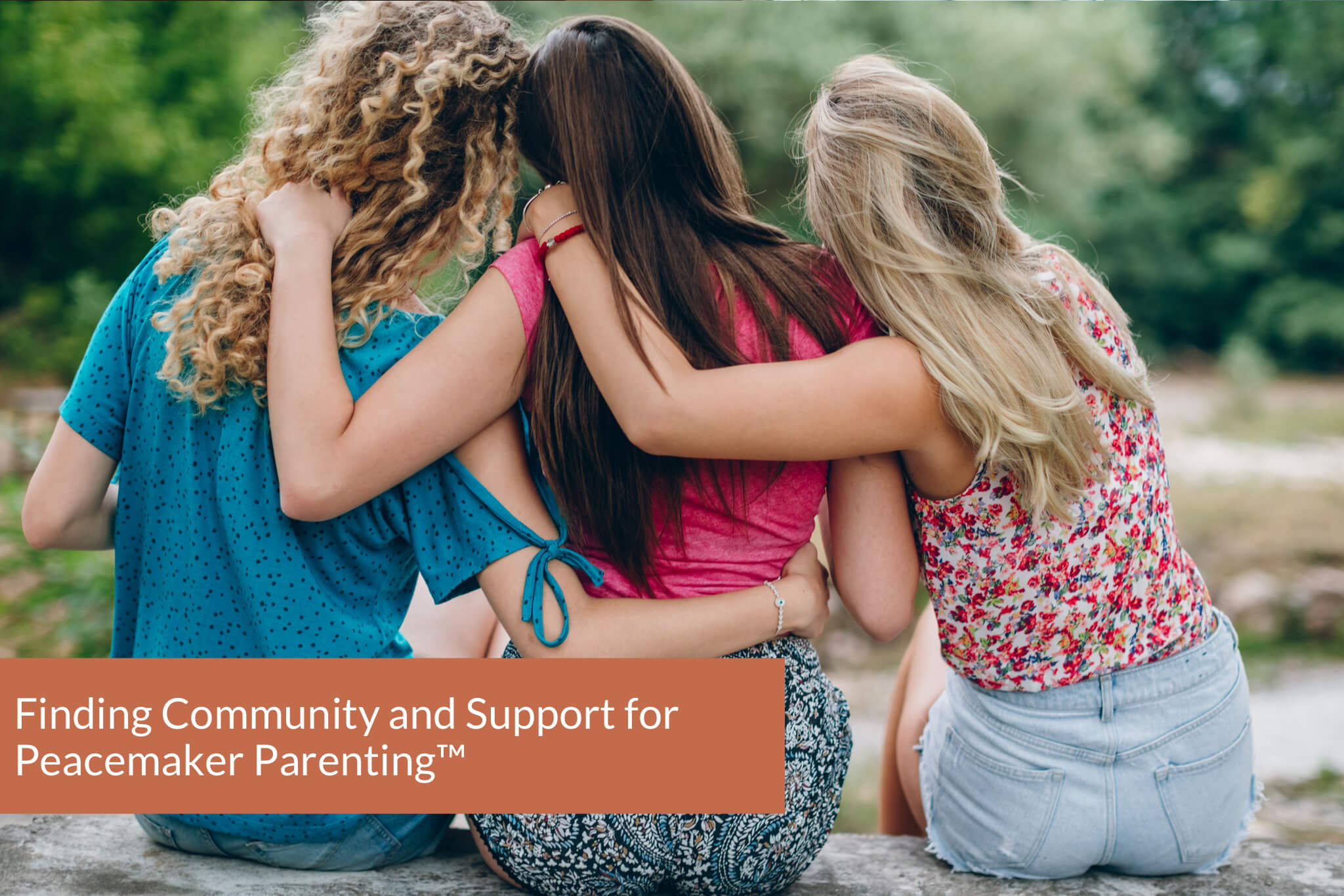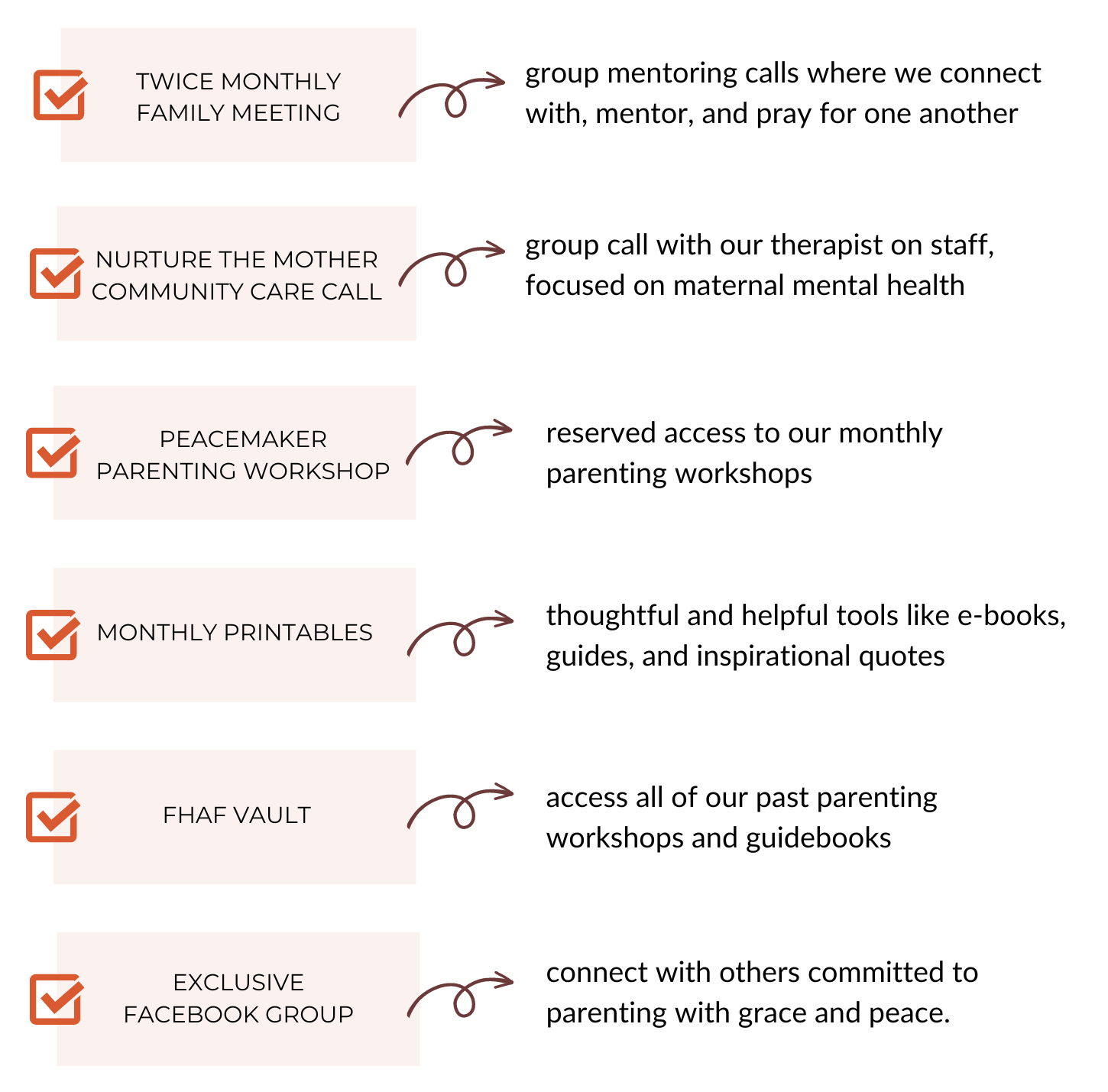
Having support as a parent is so valuable–whether that’s from involved grandparents, daycare and school settings, reliable babysitters, and of course, co-parents. But there is just something so special and encouraging about walking through the parenting journey with other parents who are on the same path at the same time. Bouncing ideas off each other, receiving solidarity in tough moments, and sometimes even physical support during tough seasons like postpartum or during a health crisis.
Sometimes, parents may have friends or siblings who have kids the same age, but their parenting approaches might be different. This can be challenging, and make it even more meaningful when you find families who you align well with.
If you’re having a tough time “finding your tribe” as a gentle, peacemaking parent, we have some ideas for you to help foster those relationships and support. We all need encouragement, and these days there are more and more parents choosing to raise their kids in a respectful way. Here are some ideas for how to find community.
- Know What You’re Looking For. We follow Peacemaker Parenting, a model for parenting that is rooted in the teachings of Jesus and backed by modern neuroscience. It equips parents and caregivers to develop deeply connected and secure relationships with their children, and empowers them with tools and strategies to lead and guide their families with Jesus, and His grace, at the center. There are many similar terms that speak to the relationship-driven aspect of parenting we practice, that include “gentle parenting,” “respectful parenting,” “aware parenting,” “RIE,” "conscious parenting," "connected parenting," “attachment parenting,” and more. These forms of parenting will emphasize understanding, communication, and respect, often challenging traditional disciplinary methods, but may not include Christian values by their definitions. From an educational perspective, Waldorf, Reggio Emilia, Montessori, Charlotte Mason, Unschooling, and Play-Based schools, preschools, co-ops, pods and homeschool groups may also share elements of relationship-based, child-development-informed philosophies. Do a little research to find out what kind of parenting and educational philosophies resonate with you, so you can better narrow down what groups will fit you best.
- Attend Local Parenting Groups. Many cities have parenting groups that meet regularly to discuss various parenting philosophies (see keyword ideas above). Check local community centers, libraries, churches, and parenting resource centers for group meetings or events. Local Facebook groups can be a great way to find meetups in your area. Meeting other parents in person can provide a sense of camaraderie and firsthand sharing of experiences, even if the parenting style doesn’t perfectly align with your approach.
- Join Online Communities. The internet offers a plethora of resources for gentle parenting. Social media platforms like Facebook and Instagram have groups and pages with so much free information and ideas to help you on your journey. These groups provide a space to share experiences, seek advice, and receive encouragement from like-minded parents. Check out the Flourishing Homes & Families Facebook Group!
- Participate in Workshops and Seminars. Workshops and seminars on authoritative parenting can be an excellent way to deepen your understanding of this approach while connecting with other parents. These events, often hosted by parenting experts, provide practical tools and insights and create opportunities for networking with fellow attendees. Did you know that FH&F offers low-cost live monthly workshops? Sign up for our next workshop HERE, or browse past topics by clicking HERE!
- Engage with Parenting Blogs and Podcasts. There are numerous blogs and podcasts focused on authoritative parenting. Bloggers and podcasters often share their personal journeys, tips, and strategies, fostering a sense of community among their audience. Engaging with these platforms can offer not only guidance but also the reassurance that you’re not alone in your parenting approach. You can find a list of some of our favorites here.
- Create Your Own Support Group. If you can’t find an existing group that suits your needs, consider starting your own. You can begin with a few like-minded friends or acquaintances and gradually expand. Meet regularly to discuss challenges, share successes, and support each other. Use platforms like Meetup or Facebook Groups to organize and attract more parents interested in gentle parenting.
- Seek Professional Guidance. Sometimes, individual support from a parenting coach or therapist who specializes in authoritative parenting can be invaluable. These professionals can provide personalized advice and strategies, helping you navigate specific challenges and reinforcing your parenting philosophy. Did you know that Dr. David and Amanda Erickson offer one-on-one coaching to individuals and couples? They are certified parent coaches through Connected Families, and bring heartfelt, personalized support for your unique parenting struggles using the Connected Families framework. Click Here to learn more.
- Connect Through Schools and Daycares. Schools and daycares often have parent groups or committees where you can connect with other parents. These settings can be conducive to discussing and promoting gentle parenting principles, as you can share resources and support each other in creating a consistent approach both at home and in educational environments.
- Utilize Parenting Apps. There are apps designed to connect parents and provide a platform for sharing advice and experiences. Apps like Peanut and Mush are great for finding local parents with similar parenting styles, arranging playdates, and discussing parenting topics.
- Join The Mentorship. The Mentorship is an exclusive, members-only community of resources, mentoring, group coaching brought to you by Flourishing Homes & Families. With twice-monthly Family Meetings (group coaching), monthly Nurture the Mother calls (led by an LPC in Maternal Mental Health), and access to our entire library of online workshops, this growing community is designed to help you find support and encouragement with other Peacemaker parents.

Learn More
By actively seeking out these resources and communities, parents practicing gentle, respectful, and non-punitive parenting can find the support and camaraderie they need. Building a network of like-minded individuals not only enhances the parenting experience but also strengthens the commitment to nurturing and empathetic parenting practices.













0 Comments